Bolivia, Venezuela Reject US Drug Criticismby Phillip SmithStoptheDrugWar.org Sep. 18, 2012 |
Popular 
John Hagee Cheers Israel-Iran Battle as 'Gog and Magog War,' Will Lobby Congress Not to Deescalate
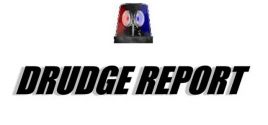
Right-Wing Media See Traffic Plummet in Wake of Algorithm Changes by Facebook, Google
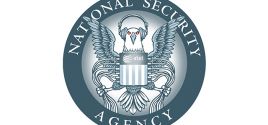
Patriot ACT on Steroids: FISA Bill Forces 'An Enormous Range' of Businesses to Act as NSA Spies
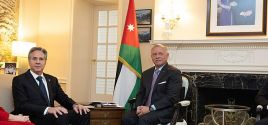
Israel to Extend Water Agreement With Jordan 'For Helping Shoot Down Iranian Drones'
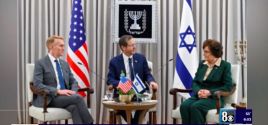
Congress Introduces ADL-Backed 'Countering Antisemitism Act' to Police Online Speech
 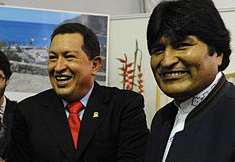 Last Thursday, the White House released its annual determination of major drug trafficking or producing countries, singling out Bolivia, Burma, and Venezuela as countries that have failed to comply with US drug policy demands. That has sparked sharp and pointed reactions from Bolivia and Venezuela. Last Thursday, the White House released its annual determination of major drug trafficking or producing countries, singling out Bolivia, Burma, and Venezuela as countries that have failed to comply with US drug policy demands. That has sparked sharp and pointed reactions from Bolivia and Venezuela."I hereby designate Bolivia, Burma, and Venezuela as countries that have failed demonstrably during the previous 12 months to make substantial efforts to adhere to their obligations under international counternarcotics agreements," President Obama said in the determination. That marks the fourth year in a row the US has singled out Bolivia and Venezuela, which are left-leaning regional allies highly critical of US influence in Latin America. But while the US has once again put the two countries on its drug policy black list, it is not blocking foreign assistance to them because "support for programs to aid Bolivia and Venezuela are vital to the national interests of the United States." But despite that caveat, Bolivia and Venezuela were having none of it. "Venezuela deplores the United States government's insistence on undermining bilateral relations by publishing this kind of document, with no respect for the sovereignty and dignity of the Venezuelan people," the Venezuelan Foreign Ministry said in a communique Friday. Venezuela "rejects in the most decided manner the accusations of the government of the United States," the communique said, adding that the presidential determination is "plagued with false statements, political preconceptions and veiled threats," which only repeat its "permanent line of aggression against independent sovereign governments." Venezuela also counterpunched, accusing the US of allowing "a fluid transit" of drugs across its borders" and "the laundering of capital from drug trafficking through the financial system." "The government of the United States has become principally responsible for this plague that is the scourge of the entire world," it said. The foreign ministry added that Venezuela's anti-drug efforts improved after it kicked out the DEA in 2005, that it has been free of illegal drug crops since 2006, and that it has actively pursued leading drug traffickers, including 19 it had extradited to the US since 2006. Bolivian President Evo Morales, for his part, said the US, home of the world's largest drug consumer market, had no grounds on which to criticize other countries about its war on drugs. "The United States has no morality, authority or ethics that would allow it to speak about the war on drugs. Do you know why? Because the biggest market for cocaine and other drugs is the United States," Morales said in a Saturday speech. "They should tell us by what percentage they have reduced the internal (drug) market. The internal market keeps growing and in some states of the United States they're even legalizing the sale of cocaine under medical control," the Bolivian president said. It's unclear what Morales was trying to say with that latter remark. Although as a Schedule II drug, cocaine can be prescribed by a doctor, there are no moves by any US state to legalize its use. Some 17 US states and the District of Columbia have, however, moved to legalize the sale of marijuana under medical control. "I'm convinced that the drug trade is no less than the United States' best business," Morales added, noting that since the first international drug control treaties were signed in 1961, drug trafficked has blossomed, not declined. He said he has suggested to South American leaders that they form a commission to report on how well Washington is doing in its war on drugs. Morales also took the occasion to lambaste the US for opposing Bolivia's request before the United Nations to modify that 1961 treaty to acknowledge that chewing coca leaf is "an ancestral cultural practice" in the Andes. Like Venezuela, Bolivia protested that it, too, has been fighting drug trafficking. The Bolivian government said that it had seized 182 tons of cocaine since Morales took power in 2006, compared to only 49 tons confiscated in the previous five years. Bolivia has seized 31 tons of cocaine so far this year, most of it from Peru, the government said. The US presidential determination named the following countries as major illicit drug producing or trafficking countries: Afghanistan, the Bahamas, Belize, Bolivia, Burma, Colombia, Costa Rica, the Dominican Republic, Ecuador, El Salvador, Guatemala, Haiti, Honduras, India, Jamaica, Laos, Mexico, Nicaragua, Pakistan, Panama, Peru, and Venezuela. It did not provide a list of major drug consuming countries. |



